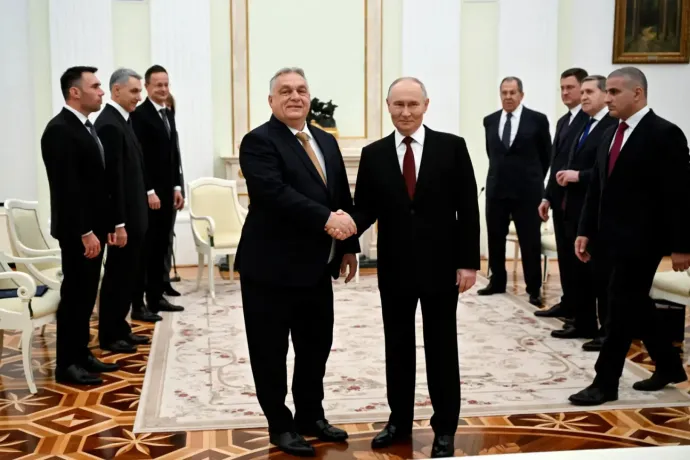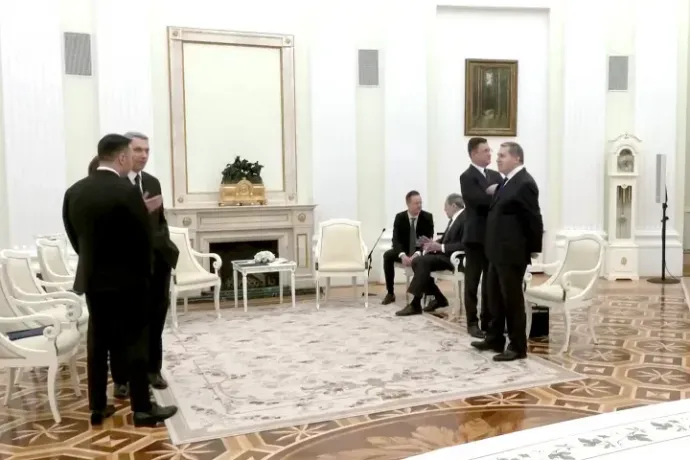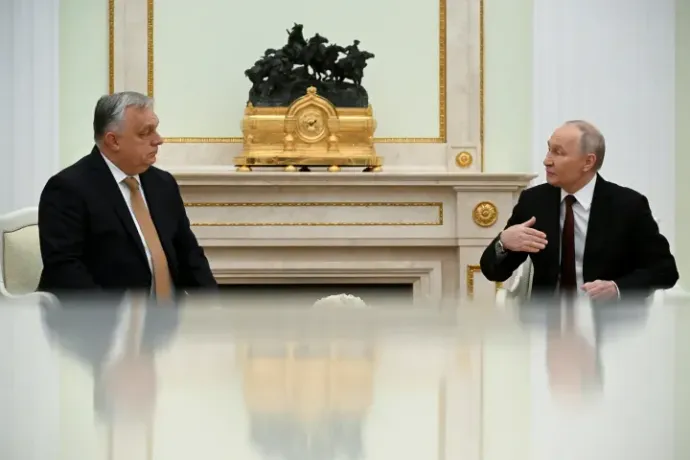
"Our views on international affairs may not converge on everything, but we have created an atmosphere in which all issues can be discussed," said Vladimir Putin, when greeting Viktor Orbán at their meeting in Moscow on Friday. "Not only does this allow us to talk, but also to seek solutions to the issues." Putin also praised Orbán's "balanced opinion" on Ukraine.
Orbán responded to Putin by saying that "we have done a lot for the cooperation between our two peoples in terms of historical perspectives, and I hope we will continue to do more in the future." The Hungarian Prime Minister said that relations between Hungary and Russia are continuous and that they have not given up on them under any kind of pressure. Orbán added that Russia continues to have a strong influence on Hungary's energy supply and that he greatly appreciates the reliability of Russian deliveries. He said he would like to discuss this subject with Putin today.
In relation to the war in Ukraine, the Hungarian Prime Minister noted that as Hungary neighbours Ukraine, the war has had a significant impact on the country's economy, causing significant losses. “I will tell you what I have said before: Hungary is interested in peace and we very much hope that the proposals on the table will lead to a ceasefire and peace", he said. According to the Prime Minister, Hungary is ready to contribute to the success of the peace negotiations.
Putin, however, considered economic relations to be in need of improvement: "I regretted to learn that trade had fallen by 23 percent, primarily due to international circumstances. This year, however, we have seen a 7 percent increase in the volume of trade. There are issues and problems that we need to discuss in the field of energy," Putin said, but the Hungarian delegation was only able to hear a very limited amount of this through the interpreter.
In the Hungarian delegation: Szijjártó, Lázár, and Marcell Bíró
Orbán gave his usual Friday morning interview to the public radio at the airport today. The reason for the early departure is that due to the war in Ukraine, to get to Moscow, the plane must avoid the usual route, and needs to first go south, through Turkish airspace to the Caucasus, and from there north to Moscow. In his early morning statement, the Prime Minister confirmed that he was traveling to meet with Putin in order to keep up imports of Russian natural gas and crude oil. He is accompanied by Péter Szijjártó, Minister of Foreign Affairs and Trade, János Lázár, Minister of Construction and Transport, and Marcell Bíró, the Prime Minister's Chief National Security Advisor. However, Energy Minister Csaba Lantos is not there, and according to reports, the Hungarian oil giant, MOL is not represented in the delegation either.
On the Russian side, alongside Putin, the negotiations are attended by the President's foreign policy advisor, Yuri Ushakov, Foreign Minister Sergey Lavrov, and Deputy Prime Minister Alexander Novak. The 54-year-old politician, born in Donetsk, was energy minister for many years and currently oversees fuel supplies, which are a key area for Russia in its war against Ukraine.
The live broadcast showed the two delegations waiting for Orbán and Putin. Hungarian Foreign Minister Szijjártó moved around comfortably and chatted amiably with Lavrov, while Lázár spoke only with Bíró on one side of the room, with Novak and Usakov talking at the other side.

After half an hour of mingling, Usakov, Bíró, and Lázár also joined in the conversation.
Orbán in Moscow again
Viktor Orbán is the only EU leader to have traveled to Russia for the second time since the start of the war in Ukraine to hold talks with Vladimir Putin. The Prime Minister's Friday visit was officially only announced on Thursday, and – at least publicly – neither the EU nor NATO members were informed in advance, similarly to when Orbán traveled to Moscow a year and a half ago, prompting criticism from the leaders of several allied countries.
The Hungarian Prime Minister was first to publicly speak about the planned trip on Thursday, without mentioning the location, and then the Russian President did the same, noting that the meeting had been initiated by the Russian side. Their statements also revealed that the talks would focus on energy, but they highlighted different areas: Putin spoke about nuclear energy, including the procurement of nuclear fuel. Until now, Russia has been the sole source of this for Hungary, but, as Putin also pointed out, Orbán signed an agreement with the American company Westing House during his trip to Washington in early November on the procurement of nuclear fuel for the Paks nuclear power plant, as well as for the long-term safe storage of spent fuel.
Orbán, meanwhile, mentioned fossil fuels at a joint press conference with Aleksandar Vučić during his trip to Serbia. He stated that since Hungary lacks significant deposits of its own, it is dependent on imports of natural gas and crude oil, primarily from Russian sources, and it must ensure that this remains the case in the future and that the international sanctions imposed on Russia do not interfere with this. The EU has, incidentally, ensured this by granting exemptions from sanctions on Russian crude oil pipeline imports for Hungary, Slovakia, and the Czech Republic, although the latter has taken serious steps towards replacing Russian sources.
The new sanctions announced by Trump at the end of October affect Russia's two largest oil companies, Lukoil and Rosneft. During Orbán's visit to Washington on 7 November, Hungary was granted an exemption from the sanctions on Russian oil for an indefinite period, according to the Hungarian government – while according to US Secretary of State Marco Rubio, for one year. The EU exemption from the ban on Russian crude oil imports is still in force, and there is also a valid natural gas contract – given that Hungary has done little to reduce its dependence on Russian energy sources – so for the time being, supplying the country from Russia can be maintained.

Russia, which is at war with Ukraine, derives most of its revenue from energy exports, which is why all the countries that buy from it are subject to criticism. Hungary's share in this is 2-3 percent, which is not much in itself, but it does send a political message that there is still an EU and NATO member that opposes sanctions and argues for maintaining this.
It is no coincidence that Orbán held talks with the Serbian president just before his trip on Friday: Serbia's only oil refinery is owned by the Serbian state oil company (NIS), in which Russia has a stake of over 50 percent, meaning that under US sanctions, it cannot receive crude oil. Orbán may have negotiated and consulted from Washington through Belgrade to Moscow that a Hungarian owner could also appear in the refinery. This would reduce Russian ownership to below 50 percent, if any were to remain, thus avoiding sanctions.
Another topic that may be discussed in the context of the sanctions – although there has been no specific mention of this – is the potential takeover of Lukoil's Balkan network by a Hungarian party, now that the Russian oil company is essentially ending its foreign operations due to US sanctions.
All of the above is inextricably linked to the war in Ukraine—which is why the sanctions are in place – and the meeting comes at a sensitive time in this regard: last week, a 28-point US plan to end the war was leaked, but the list mainly reflected the interests of Russia, showing that after a few twists and turns, Donald Trump would once again put pressure on Ukraine to make peace with the aggressor, Russia. This was followed by major diplomatic manoeuvres by the EU and Ukraine, Russia and the United States, with US-Ukrainian talks in Geneva, US-Russian talks in Abu Dhabi, and in addition to the 28-point American plan, a 24-point plan was put forward by key European members of the EU and NATO. These plans, which are very vague on many key points, including the security guarantees to be provided to Ukraine against Russia, have now been reduced to 19 points, although the details are still not known.
The Hungarian government criticized the Europeans' 24-point proposal and strongly supported the 28-point plan, which even some members of the Republican Party believe resembles a wish list from Russia. The Kremlin also considered this plan a good starting point, so the Hungarian government's position on it—given that Hungary is a member of the EU and NATO—could serve the Russian side well, which may have laid the groundwork for Friday's meeting.
On Thursday, Putin emphasized that Orbán is particularly welcome because he “sees the realities and bases his position on them.”
For more quick, accurate and impartial news from and about Hungary, subscribe to the Telex English newsletter!